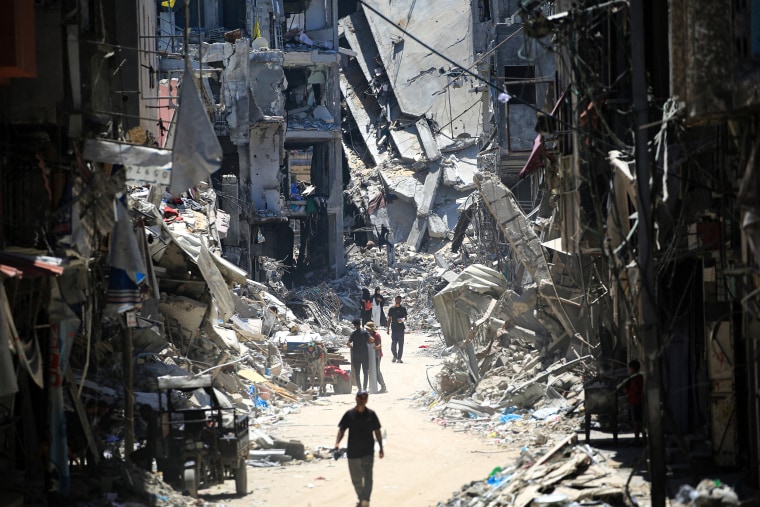DOHA, Qatar — The U.S. said Wednesday that Hamas’ demands were thwarting its push for a cease-fire with Israel as the United Nations accused both sides of war crimes and Hezbollah unleashed a rocket barrage to avenge a top commander's killing that threatened wider escalation.
Secretary of State Antony Blinken said the Palestinian militant group had requested "numerous" changes to the Washington-backed plan to end fighting in the Gaza Strip and release hostages taken from Israel on Oct. 7.
"Some of those are workable changes, some are not," Blinken said in Qatar, speaking on his latest round of shuttle diplomacy to try to advance a deal that neither warring party has fully embraced.
Giving the briefing hours after Hamas delivered its formal response, he said Washington would keep working with meditators to try to secure an agreement.
Hezbollah's retaliatory attacks
Blinken spoke on a day of intense activity, both military and diplomatic, across the Middle East.
The Lebanese militant group Hezbollah, a Hamas ally that is also backed by Iran, launched a "massive" volley of 200 missiles into Israel, the Israeli military said.
It was a significant flare-up on Israel’s northern front with Lebanon, which many observers fear could escalate into full-blown regional war.
The Israel Defense Forces told NBC News that one of the missiles struck a factory in Kibbutz Sasa, 3 miles from the border. Most of the rockets were intercepted or fell in open country, and Israeli jets struck back at launchers inside Lebanon, the IDF said.
Hezbollah said the barrage was in retaliation for Israel’s killing of one of its top commanders, Taleb Sami Abdullah.
Abdullah, 55, also known as Hajj Abu Taleb, who had been in charge of a unit that oversees parts of the southern border region, was the most senior figure from the militant group killed since the fighting began.
He was killed in an Israeli airstrike on what the IDF called a "command and control center" in the town of Joya late Tuesday. The attack also killed three other operatives, the IDF said in a statement accompanied by video of the strike.


Cease-fire talks in the balance
The Israeli government has signaled in recent weeks that it may step up its actions in the north, under growing pressure to respond more forcefully to Hezbollah after months of simmering tensions and deadly exchanges.
Hezbollah has the largest missile arsenal of any non-state actor in the world, according to weapons watchdogs. Many observers consider its conflict with Israel to have the biggest potential for all-out escalation among the regionwide tensions.
Conscious of the risk, Blinken has been in the Middle East all week on his eighth visit since the war began.
He is here to push a U.S.-drafted plan that aims to secure a truce and the release of the remaining hostages held in the Palestinian enclave. The U.N. Security Council endorsed it Monday, and Hamas gave its awaited response Tuesday.
Even before Blinken spoke, there were hints that a gulf remained between the two sides' positions.
A source familiar with the situation said Hamas’ reply had “contained amendments to the Israeli proposal," including setting a firm timeline for the cease-fire and withdrawal of Israeli troops.
There are also doubts over Israel's commitment to the deal, which were only fueled by the weekend's deadly rescue operation.
Prime Minister Benjamin Netanyahu is under pressure from right-wing members of his government to reject the U.S.-backed plan and from hostage families to embrace it.

Blinken rejected that suggestion Wednesday, saying, "Israel accepted the proposal, as it was and as it is."
He criticized Hamas as the sole holdout.
“A deal is on the table” that “the entire world is behind,” Blinken said at a news conference. “Israel has accepted it, and Hamas could have answered with a single word: yes.”
Hamas took 12 days to issue its official reply. “You get to a point where, if one side continues to change its demands, you have to question whether they’re proceeding in good faith or not,” Blinken said.
"The longer this goes on, the more people will suffer," he added. "It’s time for the haggling to stop."
This week Blinken has ramped up pressure on Hamas’ military leader, Yahya Sinwar, to accept the deal, adding that Netanyahu confirmed his acceptance when they met Monday night.
The two parties disagree over whether the initial six-week cease-fire should be permanent, as Hamas demands, and whether Israel should completely withdraw from Gaza, with U.S. officials trying to bridge that wide divide.
Until something gives, the violence on the ground will continue.
U.N. probe says both sides committed war crimes
The report from the U.N. independent commission said Hamas “deliberately killed” civilians, “mistreated” hostages and carried out “sexual and gender-based violence” against Israeli and foreign nationals on Oct. 7.
“These actions constitute war crimes and violations and abuses” of international humanitarian law and human rights law, it said.
It accused Israel of the same, as well as crimes against humanity.
The report said Israel’s “chosen strategy for the use of force” had resulted in “immense numbers of civilian casualties and widespread destruction” in Gaza.

It has shown “intent to cause maximum damage, disregarding distinction, proportionality and adequate precautions” and an “intentional and direct attack on the civilian population, particularly affecting women and children,” it added.
On Wednesday, Israel's mission at the U.N. rejected the “abhorrent and immoral accusations” and accused the commission of “systematic anti-Israeli discrimination” and seeing the conflict only “through the lens of the Palestinian narrative.”
About 1,200 people were killed and around 250 were taken hostage in the Hamas-led assault eight months ago, according to Israeli officials, and more than 37,000 people have been killed in Israel's assault on Gaza, according to local health officials.
Andrea Mitchell reported from Doha and Alexander Smith from London.

